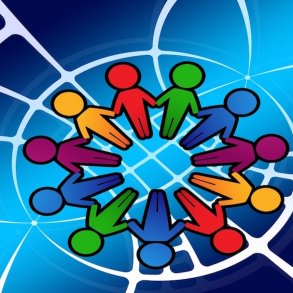By Otti Vogt, originally delivered at the first annual Teal Around the World online conference July 2020. You can find the full recording here and the full transcript and presentation here.
The original talk is republished by EE Magazine in three parts. Part 1 is here. Part 3 is here.
Uniting Leaders to Craft the Organizations of the Future
Port 3: People
Now we are plain sailing in open waters – on the lookout for our first true island of reflection. Our people. How can we unleash the creativity of our people? How to turn office workers into self-actualising innovation “privateers”?
For decades, we have been trained to see humans as strictly rational consumers in economic markets. In our businesses, we have treated people like easily replaceable human “capital” or as exchangeable “resources” to be controlled. As a result, more than 75% of employees feel disengaged. Going forward, we truly must put people first.
From Identity to Individuation We must re-learn to cherish their uniqueness and design our organisations to fulfil their human needs: their sense of orientation, belonging, autonomy, self-esteem. True success is when every human being at work has the ability to develop, use their creativity and have impact. When agency becomes activism.
We must re-learn to cherish their uniqueness and design our organisations to fulfil their human needs: their sense of orientation, belonging, autonomy, self-esteem. True success is when every human being at work has the ability to develop, use their creativity and have impact. When agency becomes activism.
This won’t be automatic. In a world where we are ‘required’ to wear many different masks, our public identity has become disengaged from our inner life and it has become challenging just to ‘be’ with ourselves and with each other, resulting in dualism and tensions. Everything we call “mental health” is fundamentally related to interpersonal processes – “All problems are relationship problems”. Therefore, in deliberately developmental organisations we must help individuals to recognise their own biases and needs, anxieties, attachment styles, defense and copying mechanisms — in order to attain self-esteem and agency, and to grow their ability to work with and care for others, and co-generate meaning and value in service of the community. Our “inner game is our outer game”. Or as Laloux says: “We can only go far into the “we” if we fully inhabit the “I””.
Therefore, in deliberately developmental organisations we must help individuals to recognise their own biases and needs, anxieties, attachment styles, defense and copying mechanisms — in order to attain self-esteem and agency, and to grow their ability to work with and care for others, and co-generate meaning and value in service of the community. Our “inner game is our outer game”. Or as Laloux says: “We can only go far into the “we” if we fully inhabit the “I””.
And by matching desires and competencies of individuals with meaningful activities we can enable “flow”, personal development, and ultimately happiness @ work. Yet, happiness, as Aristotle suggested, is not about pleasure, wealth, income, how many followers we have on twitter, always getting all we can – but a matter of growing our character in a lifetime of personal development, the cultivation of those virtues that make us good human beings.
Port 4: Teams
But happier individuals won’t be enough – organisational learning is a team sport. How can we channel the creativity of individuals into collective organisational learning and evolution at scale?
Now, let me ask you, do you feel you can truly bring your ideas to the front rows of your organisation? If not, you are not alone. Only 20% of people feel their opinion counts and 70% report new ideas are met with hostility! And no surprise, imagination often requires us to operate outside the rules of the game, which is a deeply political act. Blimey, here we are truly in the doldrums!
In my experience, if we want to enable self-organisation and organisational learning at scale, we need to adapt the context for our teams at multiple levels, in terms of structure and management processes, and team dynamics:
From Domination to Dialogue Above all, we need to pay careful attention to distribution of information, knowledge and power. Existing systems often distort or suppress information. In the future, radical transparency should prevail – as the say at Viisi: “Everything is public unless its harmful”. Strategy becomes a firm-wide conversation.
Above all, we need to pay careful attention to distribution of information, knowledge and power. Existing systems often distort or suppress information. In the future, radical transparency should prevail – as the say at Viisi: “Everything is public unless its harmful”. Strategy becomes a firm-wide conversation.
- In terms of power, central authority does not lend itself to decentralised experimentation and learning. Self-generative complex systems need boundaries, but will be stifled if positional power is imposed. In ING, we were one of the first banks to roll out Agile at scale, globally and beyond IT across most functions. And as we demonstrated, Agile can provide more flexibility within the pyramid, enabling self- organisation and cross-functional flows of information and decision-making. But I have also seen many agile implementations struggle because they never dealt with existing power or ownership structures.
- Following on from Agile, I believe we will see more “ambidextrous” organisations that can enable exploitation of the existing and exploration of the new, but it won’t stop there. We are already witnessing experiments with meshed and adaptive networks of teams, market-oriented ecosystems, and interconnected circles in holacracy and sociocracy.
- In terms of management processes – organisational learning requires both order and freedom. Bill Torbert speaks of “liberating structures”, like principles, roles, routines, rituals, methodologies — to enable and host “generative dialogue” involving as many people as possible, supporting both single and “double-loop” learning.
- And learning entails mechanisms to manage tensions and navigate paradox — by its very nature, total consensus would overwhelm complex systems and we need procedures to attain not consensus, but consent.
- It also requires adaptation of anachronistic HR and finance practices. Focus moves from individual high performers towards group dynamics. Compensation needs to correlate with team impact on collective purpose. Performance management must facilitate self-reflection and peer coaching. And we need to evolve resource allocation “beyond budgeting”.
I envisage that over time, our entire organisation will become a laboratory of ideas, integrating “action and inquiry” into everything we do, to always keep sensing and exploring and experimenting whilst we are moving — in teams and “peer communities” of learning.
Port 5: Leadership
Sounds like a plan? Full sail ahead, explorers and leaders of the future, there’s land in sight!
Alas, this story wouldn’t be significant if it were straightforward to reach our destination. In fact, with increasing complexity and urgency, leadership itself has become a lot more difficult. Business schools have for decades been training generations of managers and leaders in that seductive and simplistic logic of principle-agent theory.
Where a leadership elite which has the power instructs the masses of reluctant workers who have little power on what to do. Deploying sticks and carrots as necessary to adjust their behaviours. Unfortunately, to move forward, leadership must radically change.
From Hero to Alchemist In a world of self-organisation, there is no place anymore for patriarchal Commanders in Chief, men or women, who narcissistically rule by positional power and dominance.
In a world of self-organisation, there is no place anymore for patriarchal Commanders in Chief, men or women, who narcissistically rule by positional power and dominance.
- Agile leaders “set destination, not direction”. They focus on the why, not the how. Decisions are always made at the lowest possible level, close to the customer.
- Rather than telling people what to do, leaders today need to become experts in building, sensing, caring for and influencing organisational systems; coaching individuals and teams; and enabling co-creation and emergence of shared purpose. Placing their needles like acupuncturists to facilitate the energy flows in an organisational body.
- In such a new world we need Chief Communicators who earn the respects of their people by making personal sacrifices to serve the collective good. And Chief Connectors who can create a cultural force field of energy – fostering psychological safety and trust; Reinforcing transparency and embracing failure; role modelling gratitude, compassion and kindness.
 Such a new “transpersonal” leadership paradigm is more than just EQ — it integrates intellectual, emotional and spiritual intelligence. It integrates the male and female, the cognitive and the emotional, will and wonder.
Such a new “transpersonal” leadership paradigm is more than just EQ — it integrates intellectual, emotional and spiritual intelligence. It integrates the male and female, the cognitive and the emotional, will and wonder.
- Future leaders will truly understand, with heart and mind and soul, how all hangs together in a “web of life” including their own self.
- They “lead beyond the ego”, as John Knights writes. Allowing time for awareness and reflection, rather than jumping into action. Letting go to become vulnerable “imperfectionists”. Hearing their “soul knocking at the ego’s door”.
- Bill Torbert calls these leaders “Alchemists” — leaders who can access the magical mutual power of transformation, developing people to have more self-mastery and meaning and providing a “maternal holding space” for “liminal” conversations.
You can also find the recording of the discussion here fyi – https://www.youtube.com/watch?
Part 3 of this talk is here.
Here is a video of the entire presentation:
https://www.youtube.com/watch?v=UQMVzfpHOA8
Republished with permission.
Featured Image and some paragraph spacing added by Enlivening Edge Magazine.




